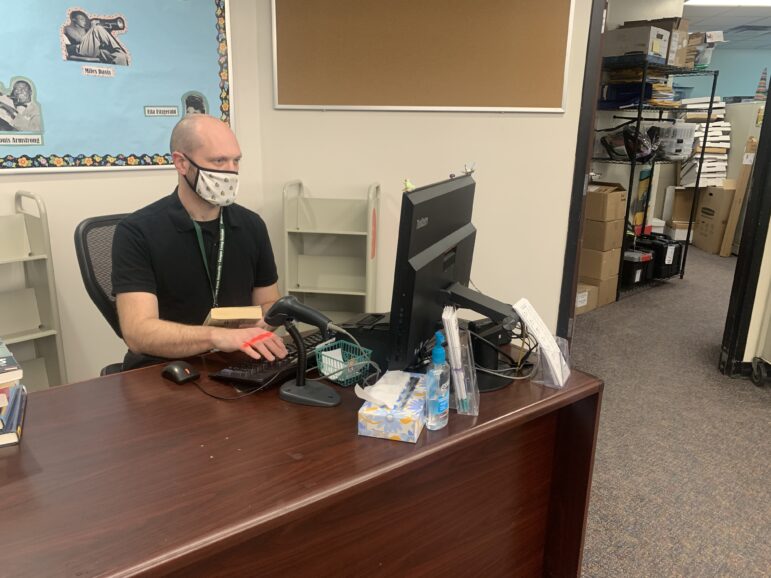
Zach Surdenik
A librarian’s assistant at the Holt-Delhi branch of the Capital Area District Library works checking in a stack of books at his desk.In July 2021, the Capital Area District Libraries announced it would no longer charge fines for overdue materials. More than seven months later, the libraries are seeing the positive effects of the decision.
Library assistant Maxine Budzynski at the Holt-Delhi branch of the CADL said she feels the policy has been received very well overall by the community.
With overdue fees eliminated, the library found a new way to ensure the return of their materials–freezing accounts. If the materials are past 10 days overdue, the person’s account is frozen and they are unable to check out anything else until it is returned. CADL Executive Director Scott Duimstra said this is better than fines and one that is closer to the group’s beliefs.
Even before the pandemic, the libraries had a goal of moving to a fine-free model, but the process is not as simple as it might seem. Prior to the move, the library relied on overdue fines for $150,000 of revenue each year, so making the switch took some major budget changes.
When looking into the analytics, the group found that there were 13,000 individuals that could no longer check out materials from the library because they had over $10 in fines.
“When we looked at where these households were compared to the CDC’s vulnerability index, it was almost a match-for-match. So we knew that fines were pricing people out of using the library, when in reality they paid for library services with their tax dollars.” Duimstra said. While the CADL’s plan was made before the pandemic, Duimstra feels that it was even more rewarding for the community in these times.
“It was great for us to release this in what was a challenging year. When you can use the library for not only books and movies, but Wi-Fi hotspots and laptops and tablets, that if someone had too many fines and couldn’t check out, maybe they couldn’t attend school or they couldn’t use the hotspot to apply for a job. I think it was perfect timing for us, but also perfect timing for the communities so that they could reengage with the library when they really needed it.” Duimstra said.
Even though the policy has been in effect for seven months, Holt-Delhi Head Librarian Karon Walter says that not everyone has been aware of the change. “We have people who come in and they’re like ‘Oh my book’s a couple days late, let me just pay what I owe.’ and we can just tell them right there and then, ‘Oh you don’t owe us a single thing, don’t worry about it.’ and we’ll check it in and they’re surprised but they’re very happy about it.”
Walter said that the change has been very helpful for the community, “This is really helpful for all of our library members to not have fines because we do know that a lot of people have been going through really hard financial times and having a library fine on top of your own hardship is just too much. That’s not what the library is here for…We’re just happy to help our communities in any way possible.”